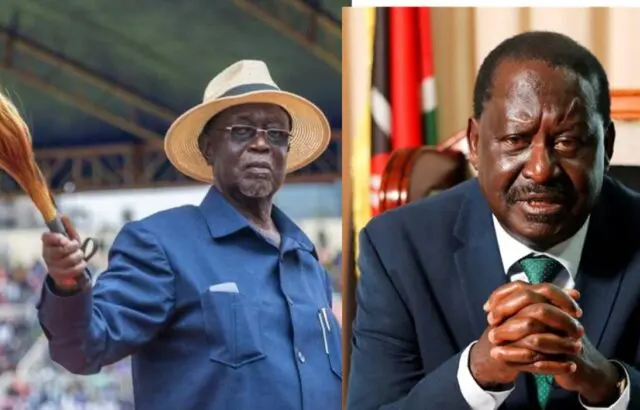
For decades, the distinct scar on Raila Odinga’s face has been a silent testament to a life marked by political turbulence and personal sacrifice. Many Kenyans, and even seasoned journalists, long assumed it to be a souvenir of his years of political detention under oppressive regimes—a period that saw the veteran opposition leader imprisoned multiple times for his activism and unwavering fight for democracy.
However, in a touching and candid moment during Raila’s funeral service, the truth behind the scar was finally revealed—not as a product of state brutality, but rather a childhood mishap, as Oburu Odinga reveals the true story behind it.
Speaking at Jaramogi Oginga Odinga University of Science and Technology in Bondo on Sunday, his elder brother, Siaya Senator Dr. Oburu Odinga, shared the little-known and surprisingly innocent story behind the scar that had become part of Raila’s iconic image.
“Raila fell from a mango tree while we were playing,” Oburu recounted to the gathering of mourners. “I had to carry him on my back. People were laughing at us as I cried after he got injured.” His words, laced with nostalgia and emotion, drew a mixture of laughter and somber reflection from those present.
Oburu further clarified that Raila’s well-known facial scar actually came from two separate childhood incidents. One occurred during their time in Germany, and the other—the scar on his mouth—was a direct result of the fall from the mango tree during their youthful escapades in Kisumu.
The revelation, as Oburu Odinga reveals true details, offered a rare glimpse into the early, personal life of a man more often remembered for his political resilience, national influence, and international recognition. It humanized a figure who, to many, was almost mythical in stature—a freedom fighter, a political prisoner, and a statesman who carried both literal and figurative scars.
Dr. Oburu Odinga also took the moment to honor Mama Ida Odinga, Raila’s widow, for her steadfast support throughout the trials and triumphs of his life. “She stood firmly by his side through the most difficult times—his long detentions and political struggles,” he said, highlighting the quiet but powerful role Mama Ida played behind the scenes.
As the nation continues to mourn the passing of Raila Odinga, Oburu’s heartfelt tribute painted a fuller picture of the man known as “Baba”—a brother, a husband, and once, simply a young boy climbing trees in Kisumu.
The scar, once viewed as a symbol of political suffering, now tells a different story—one of brotherhood, childhood innocence, and the deep bonds of family.







